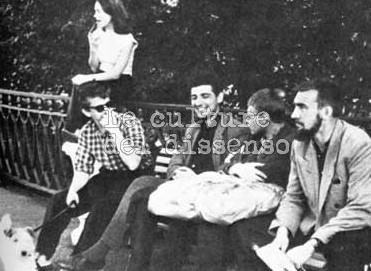
04 Dec THE PHILOLOGISTS
DATES:
1954-1956
PLACE:
Leningrad
MEMBERS:
Lev Loseff, Vladimir Uflyand, Mikhail Eremin, Sergey Kulle, Leonid Vinogradov, Mikhail Krasilnikov, Yury Mikhailov, Aleksandr Kondratov, Vladimir Gerasimov, Oleg Tselkov.
PUBLISHING INITIATIVES:
Brynza (Bryndza) and S’’edim brynzu! (Let’s eat bryndza!) almanacs, 1951-1952; poetic anthology UVEK (1977).
DESCRIPTION:
It was the creative mind of Kostantin Kuzminsky that gave the group of poets known as the ‘Philologists’ (Filologicheskaya shkola) their name. The group first came together in 1954 during the LITO (acronym for Literaturnoe ob”edinenie, that means “Literary society”) sessions at the Faculty of Philology and included Lev Loseff, Vladimir Uflyand, Mikhail Eremin, Sergey Kulle, Leonid Vinogradov, Mikhail Krasilnikov, Yury Mikhailov and later Aleksandr Kondratov. The circle of poets, united by friendship, frequented the same places and shared a desire to flaunt dominant aesthetics. The painters Oleg Tselkov and Vladimir Gerasimov (an important figure for the encyclopaedic intellect) are sometimes associated with the group. The group is defined not so much by a set of common motifs or literary poetics, as by a shared “amateurish” attitude towards the act of creation and an indifference to the official world of publishing This is one of the main difference between the Philologists and the ‘Geologists’ (Geologicheskaya shkola), regulars at the LITO of the Leningrad Gorny Institut (Mining Institute), whose name was also coined by Kuzminsky, and whose numbers included :Andrey Bitov, Gleb Gorbovsky and Vladimir Britanishsky and others.). Some of their works were edited by contemporary publishers and journals, others circulated through the samizdat.
The works of the Philologists is varied, ranging from the alogicalism of Kulle to the irony and satire of Losev, the esotericism of Eremin’s poetry and the folklore and solemnity of Uflyand. As a group, they are among the very first to be labelled andegraund as well as the first «performance group», according to Uflyand’s definition («aktsionistskaya gruppa»). One of the key characteristics of the group’s work was a tendency to spectacularize the artistic gestures made by pioneering souls, although they nevertheless remain rooted into the Russian and Western tradition of the first half of the century. The primary aesthetic of these performances is essential (in contrast to the criminalisation politically made by Soviet authorities); not all the members of the group took part in those improvisations and their execution was not always planned in advance. One of these performances took place a few months before Stalin’s death, on the 1st of December 1952, the anniversary of Sergey Kirov’s assassination. At this time the dictator was waging a strongly nationalist (and anti-Semitic) propaganda campaign which was probably the target of the protest staged by Krasilnikov, Mikhailov and Eduard Kondratov, Aleksandr’s brother. The students attended their usual Russian literature lesson wearing clothes recalling the Russian tradition and carrying local products (a wicker basket with big onion tubers, some buns of rye bread and three bottles of kvas). After this ‘happening ante litteram’ all three were expelled from Komsomol, the Party youth organization and banished from the university (although E. Kondratov got off lightly in that he was merely forced to leave the department of journalism). Another daring exhibition was Eremin’s, Uflyand’s and Vinogradov’s «Long Live Pasternak!» performance: the three wrote the slogan in capital letters on the riverside in front of the entrance gate to the Summer Garden after the writer had been awarded the Nobel Prize. Some of the philologists-poets’ actions were severely punished: during the anniversary of the revolution (on the 7th of November 1956, a few days after the repression of the uprising in Budapest), Krasilnikov was arrested and sentenced to four years in a labour camp in Mordovia, on charges of ‘having paid tribute to «Tito Rankovich’s and Imre Nagy’s bloodthirsty gangs». The year of 1956 marks the end of the group’s golden age: not only Krasilnikov, but also Uflyand and Vinogradov were victims of repressive measures.
The openly neo-avant-garde aesthetic taste, the demonstrative gestures carried out in order to cause scandal and the special relationship with the anniversaries bring to mind the Futurism of the beginning of the century. The Philologists are sometimes remembered as ‘Krug Mikhaila Krasilnikova’ (Mikhail Krasilnikov’s Circle), ‘Osvezhisty’ (from the verb osvezhit’, ‘to freshen’) or ‘UVEKi’ (the UVEKs). This last name refers to a publication created by some of its members, a samizdat collection dated 1977, whose title is an acronym formed by the initials of the four author-editors: Uflyand, Vinogradov, Eremin and Kulle. Some members of the Filologicheskaya shkola are also credited with the publication of the Brynza (Bryndza) and S’’edim brynzu! (Let’s eat bryndza!) manuscript almanacs, published at the Faculty of Letters in 1951 or 1952 and containing Mikhailov’s, Krasilnikov’s and, perhaps, Aleksandr Kondratov’s verses.
BIBLIOGRAPHY:
D. Davydov, Shkola, izbegayushchaya definitsii, «Novy mir», n. 10, 2006, pp. 182-187.
A. Genis, Homo ludens zhiv, Intervyu s avtorami Filologicheskoj shkoly, http://www.svoboda.org/content/transcript/24200093.html (03/2018).
V. Kulle (sost.), Filologicheskaya shkola. 40 let, «Literaturnoe Obozrenie», n. 5, 1997.
V. Kulle, V. Uflyand (sost.li), Filologicheskaya shkola. Teksty. Vospominaniya. Bibliografiya, Letniy sad, Moskva 2006.
F. Iocca, Aleksandr Kondratov e le sue ipostasi: un «avanguardista accademico» nella Leningrado underground, «Enthymema», n. 12, 2015, pp. 109-112 https://riviste.unimi.it/index.php/enthymema/article/view/4948 (03/2018).
L. Losev L., Tulupy my, in K. Kuz’minskij, G. Kovalev (sost.li), Antologiya noveyshey russkoy poezii «U goluboy Laguny», Oriental Research Partners, Newtonville, Massachusetts, 1980, http://www.kkk-bluelagoon.ru/tom1/philolog.htm (03/2018; also in «Novoe Literaturnoe Obozrenie», n. 14, 1996, pp. 209-215).
T. Nikolskaya, «Filologicheskaya shkola»: retsenziya, «Staroe literaturnoe obozrenie», n. 2, 2001 (278).
S. Pavlova, Leningradsky literaturny andegraund kak kulturny fenomen: Spetsifika formirovaniya i funktsionirovaniya, «Teleskop: nablyudeniya za povsednevnoy zhiznyu peterburzhtsev», n. 2, 2004.
M. Sabbatini, «Quel che si metteva in rima»: cultura e poesia underground a Leningrado, Europa Orientalis, Salerno 2008, pp. 46-51.
D. Sukhovej, «Mne tyazhelo ottogo, chto ya deystvitel’no ostalsya odin», Intervyu s Mikhailom Ereminym, http://www.colta.ru/articles/literature/1689 (03/2018).
[Federico Iocca, 13/03/18]
[Translation by Alice Bucelli]





